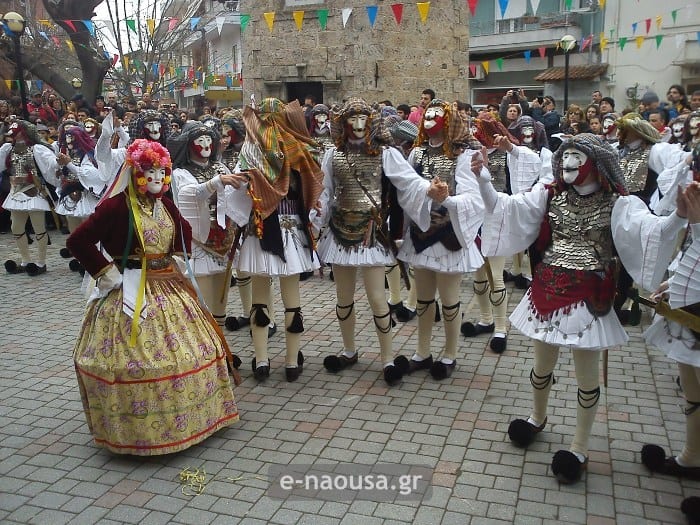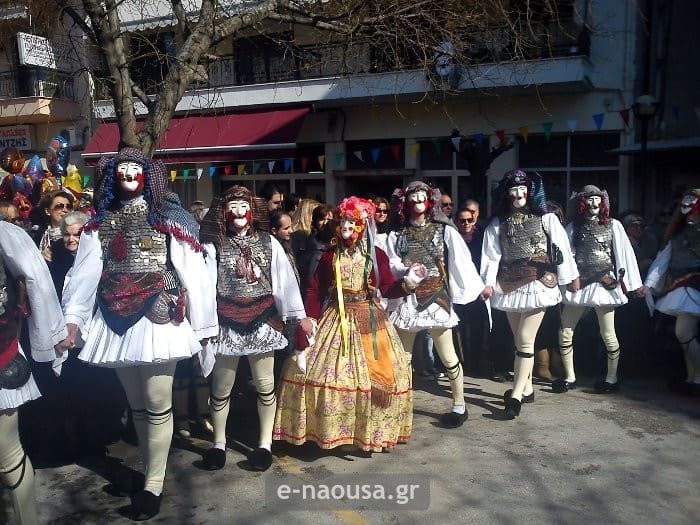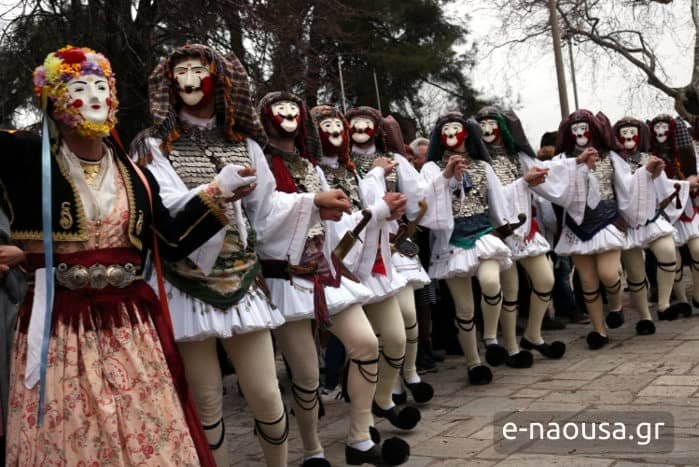With the Greek carnival period just around the corner, many cities around Greece have been preparing to host their annual traditional festivities virtually, in order to entertain carnival lovers around the country.
Besides the famous Patras Carnival, which attracts international fans and global attention every year, many northern Greek cities are also celebrating the carnival with large parades and live events, which have remained loyal to the Greek traditions for centuries.
One of the most popular festivals in the country is that of Naousa, in the state of Imathia, which focuses on the custom of the Nizamikos - a Greek dance of Naoussa for men.
The Nizamikos danced every year at the carnival of Naoussa is called "Janissaries and Boules" (Γενίτσαροι και Μπούλες).

The old tradition of Janissaries and Boules dates back to the 18th century, and every year, it creates a special atmosphere in the city of Naousa, where young men get the chance to dress up in the traditional handmade costumes and masks.
The carnival period is also the busiest touristic time in Naousa and lasts for three whole days.
Thousands of people from all over the country gather at the town hall of the city and observe the dance parade of Janissaries and Boules.

Visitors and tourists also get a chance to taste the traditional cuisine and gourmet delicacies of northern Greece as barbecues and food festivals are happening everywhere in the city.
This musical and theatrical party has its roots are in ancient Dionysian celebrations, but also in the victorious Greek Revolution of 1821.
It experienced its greatest prosperity in the late 19th and early 20th centuries, as it was considered one of the most important celebrations of modern Greece, and it has remained unchanged to this present day.

The custom differs from similar carnival events around the country, especially because it is “brought to life” only by young men – specifically in the past only young, unmarried men participated.
The Janissaries wear the traditional 1821 Revolution attire, with the foustanella pleated skirt, lots of silverware hanging from their chest and wrapped around their waist, a long palate sword strapped on their belt and a mysterious wax mask.
The roles of the Boules are also portrayed by men, who dress up in the traditional dresses of the 1821 female fighters, and impersonate – but never satirise – women of the older times, while their wax mask is adorned with lots of colourful flowers.
The lively and joyful dances are accompanied by the music of zurnas and daouli, two of the traditional instruments of the area.

For the second consecutive year in a row however, Naousa, along with other big cities in the country, such as Xanthi, have reported huge financial losses because of the cancellation of their carnivals due to the COVID-19 pandemic.
However they have announced that they will host online events instead of the usual carnival.
"We cannot have our usual carnival because of the severe health conditions and restrictions that exist. It is obvious that we, like other municipalities, are trying to make a substitute, such as a digital carnival,” said the mayor of the city, Nikolas Karanikolas.
In previous years, within the first day alone of the carnival celebrations, more than 50,000 people visited Naousa to see the parades and enjoy the festivities.
In Xanthi, more than 100,000 people from Greece, but also from Turkey and Bulgaria, visited the city each year during the carnival period.
Both cities have stated their financial losses will be at least 1.5 million euros.
“The financial damage to the city is enormous. There are so many people who are directly or indirectly involved in the events of the carnival in Naousa, that are now losing this opportunity.
"We are talking about thousands of visitors, not just for the three days of the carnival, but also for the weekend before,” Mr. Karanikolas stated.
The financial loses are reportedly going to be large for hotels, restaurants, catering services, and the overall tourism of northern Greek cities, which have been trying really hard to outlast and survive this pandemic.
“The truth is that the carnival is a party, a dance, a large event.
"These things are impossible to happen in today's conditions, so let us all hope for a better future and wait for our future celebrations,” concluded the mayor of Naousa.
Janissaries and Boules (Γενίτσαροι και Μπούλες), Naousa
Watch the video below to see the entire process of creating the Janissaros costume and mask, as well as clips from the annual parade in Naousa:
[su_youtube url="https://www.youtube.com/watch?v=gWI7DhHRimM&ab_channel=ΦωτογραφικέςΑναζητήσεις" width="700" title="'Εθιμο Γενίτσαροι & Μπούλες - Αποκριές Νάουσα "]All photos from e-naousa.gr except where noted differently.

